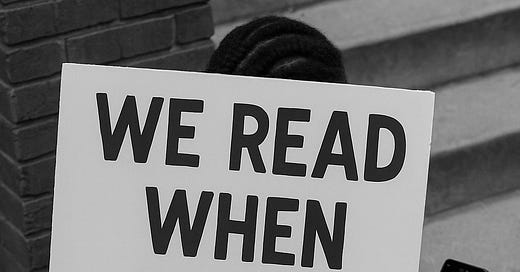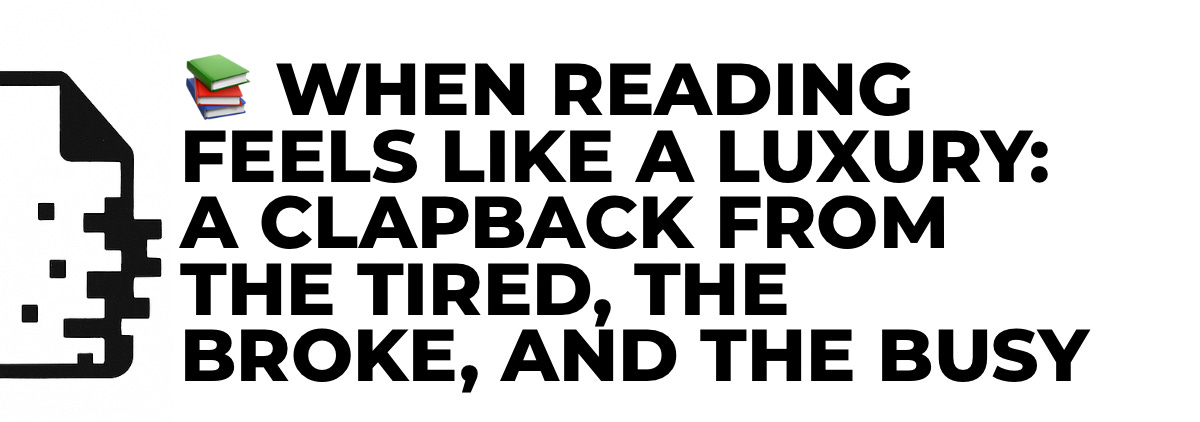I read this essay recently about how AI and TikTok are “killing reading,” and I’m still trying to unclench my jaw.
You know the kind of piece. Drenched in productivity-chic. Elegantly lamenting the death of attention spans. Telling us we’ve become dopamine zombies because we scroll more than we read novels. It framed reading like a moral virtue and short-form content like a disease. But what it really did?
It erased the people who have the least access to books, to rest, to quiet.
And so this is for the ones who are still carrying stories—but don’t always have the energy or time to hold a book. This is for the ones who never stopped loving words, but had to fight for the right to read.
Let’s talk about it.
“People stopped reading before AI showed up.”
No. Some people did. The ones with endless choices, time, and libraries that never closed.
The rest of us?
We were never given room to start.
Reading for pleasure requires stability. Requires sleep. Requires energy. And for many of us, it requires a miracle. It’s hard to “stretch your mind” when you’re constantly stretching your last dollar or your last nerve.
It’s not laziness—it’s burnout. It’s survival. It’s trying to read a book after working two jobs, only to fall asleep with the page still open.
“AI summaries are junk food for your brain.”
That’s rich coming from someone who probably has a second monitor and noise-canceling headphones. Let me tell you what real junk food is:
Reading thinkpieces that shame people for not consuming content the “right” way
Weaponizing literacy as a badge of superiority
Acting like people who use AI or TikTok are shallow or stupid
Maybe we’re not reading 90,000-word novels right now because we’re reading eviction notices, medical bills, or texts from family in crisis.
You want to talk about junk? Let’s talk about the articles that ignore class, race, access, and disability in the conversation about literacy.
“We used to read deeply. Now we just scroll.”
You know what scrolling is for some of us?
A coping mechanism. A quick laugh in between grief. A sliver of joy in a world that is constantly taking from us. A form of storytelling that fits inside a tired mind.
And for many of us?
It’s the only way we get to see ourselves reflected.
You think short-form content is shallow? I’ve seen a 15-second video say more about survival, identity, and resistance than some whole-ass memoirs.
“You can’t think deeply if you never sit with an idea.”
What a privilege it must be to have the time to sit.
Some of us are sitting in waiting rooms. Sitting in grief. Sitting in transit. Sitting with silence because no one taught us our stories were worth recording.
We think deeply all the time—just not in the way you’re used to. We carry oral history, coded language, ancestral knowledge in our bones.
And just because it’s not typeset in a Notion doc doesn’t mean it’s not wisdom.
Reading Didn’t Die. Y’all Just Forgot Us.
Reading isn’t dead.
Rest is rare.
Libraries are underfunded.
Third spaces are gone.
And the last thing anyone needs is a guilt trip disguised as inspiration.
I want to read. But I want a world where reading isn’t a luxury.
Where we build places to gather around stories.
Where we record memories before they vanish.
Where we value the people who speak in reels, riddles, rhythm, and resistance.
So no—I don’t need a gamified Notion page to make reading “feel like an achievement.”
I need my community to be remembered.
I need rest without shame.
I need space to carry books and grief at the same time.
If you’re looking for the death of deep thinking, don’t blame TikTok.
Blame capitalism. Blame erasure. Blame the systems that made knowledge a luxury item.
We didn’t stop reading.
We just haven’t been seen.







This piece really made me remember that libraries were always more than books and knowledge in them they were homes. Homes that provided resources to us that we definitely didn’t have at home. A place to get on that computer in the library because I didn’t have one back home or a place to get a since of peace because I really needed to study. Libraries are a place of shared knowledge and memory but first and foremost it’s a hub of resource gathering giving me the tools I wouldn’t otherwise have